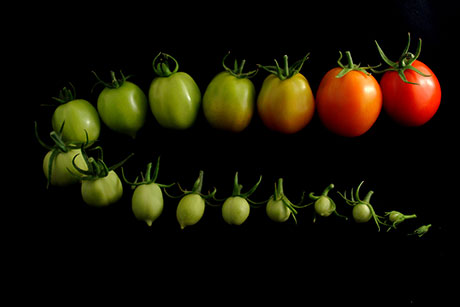News
$4.7 Million to SIPS and BTI for More Tomato Research

(Photo by Antonio Matas) Previous years of tomato research has focused on the ripening stages, but a study led by Cornell aims to identify the genes in the fruit that spur development, research that could improve cultivation in drought conditions.
A comprehensive study of gene expression in tomato fruits will explore unanswered questions about gene regulation, hormonal control and structural polymers that make up cell walls in fruits, to improve crop quality and yields.
A second part of the study will seek to understand drought tolerance in wild relatives of tomatoes.
The project, led by researchers from Cornell, and the Boyce Thompson Institute for Plant Research (BTI) and U.S. Department of Agriculture Agricultural Research Station (USDA-ARS), both located at Cornell, is made possible by a five-year, $4.7 million National Science Foundation grant.
Tomatoes serve as a model plant for studying fleshy fruit biology, but decades of research has only focused on the outer part of the fruit, and mostly on ripening stages. This study seeks to identify all the genes throughout fruit development, different tissue types, DNA that regulates those genes, hormones and their control, and the structural polymers that make up cells walls and contribute to fruit texture, and the ability to resist drying out.
Also, “water usage and water security are increasingly alarming problems,” especially considering approximately half of the cultivated surface of Earth is affected by drought, said Jocelyn Rose, the project’s principal investigator (PI), a professor of plant biology and director of Cornell’s Institute of Biotechnology. Rose and colleagues plan to generate large amounts of high-resolution genetic data and then apply that information to issues of drought tolerance.
“If we can understand how these wild tomato relatives thrive in drought conditions, we can try to introduce those traits into cultivated tomatoes or other crops,” Rose said.
Furthermore, all data will be presented in a searchable “Tomato Expression Atlas,” a data-visualizing platform that will link gene expression information with images from a computer tomography (CT) scanner, which uses X-rays to render 3-D virtual images that include internal structures. CT scanner images are composed of many slices of an object, allowing a user to take a virtual trip inside a fruit on any plane. The platform will also have a 4-D element, using slices to show changes due to fruit development over time.
The images will be linked with genetic data and will allow uses to determine exactly when and where genes are expressed, for example, in different tissues and during stages of development. “By making a digital tomato, we can start to infer the function of unknown genes,” said Rose.
The grant will also support a biotechnology symposium and workshop every summer, which will include training students in systems biology approaches to applying multiple genomics technologies and integrating large amounts of data.
The grant’s co-PIs include: Carmen Catala, a senior research associate at BTI; Zhangjun Fei, a USDA-ARS scientist, and adjunct associate professor in the Plant Pathology and Plant-Microbe Biology section in the School of Integrative Plant Science (SIPS); and James Giovanni, also a USDA-ARS scientist and adjunct professor in the Plant Breeding and Genetics section, SIPS. Lukas Mueller at BTI is providing additional database support.

